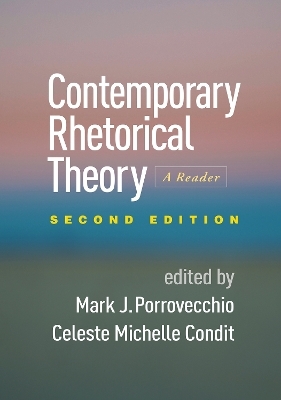
Contemporary Rhetorical Theory, Second Edition
Guilford Press (Verlag)
978-1-4625-2658-1 (ISBN)
An indispensable text--now revised and expanded for the digital age--this volume showcases some of the most important work by contemporary rhetorical theorists. The introduction and section openers frame major problems and questions facing the field. Topics include the epistemological status of rhetoric, how rhetorical address shapes public responses to social and political controversies, the shifting contexts of public communication, how theorists have negotiated the tensions between modernist and postmodernist considerations, mass media, and the relationship between rhetoric and traditionally marginalized groups. A wide range of voices from the 1970s to today are represented, including both classic essays and alternative approaches extending beyond the traditional borders of communication studies.
New to This Edition
*Reflects nearly two decades of major changes in rhetorical theory and practice.
*Includes 17 new articles and new sections on publics and counterpublics, rhetorical personae, and problems of political change.
*Addresses the sweeping impact of the Internet and digital media on the nature of public discourse.
*Shows the relevance of rhetorical theory for understanding current social issues, such as the "Black Lives Matter" movement.
*Fully revised introduction, section openers, and epilogue by the editors.
Mark J. Porrovecchio, PhD, is Director of Forensics and Associate Professor in the Department of Speech Communication at Oregon State University. He studies pragmatism and the history of speech communication and rhetoric. His work has appeared in the Western Journal of Communication, Etica & Politica, and Transactions of the Charles S. Peirce Society. Dr. Porrovecchio is the editor of Reengaging the Prospects of Rhetoric and author of F. C. S. Schiller and the Dawn of Pragmatism. Celeste Michelle Condit, PhD, is Distinguished Research Professor in the Department of Communication Studies at the University of Georgia. She studies rhetorical theory and criticism, especially in the areas of feminism, racism, rhetoric of science (genetics), and health communication, and has served as coeditor of the journals Women's Studies in Communicationand Critical Studies in Media Communication. Dr. Condit is a National Communication Association Distinguished Scholar.
Introduction, Mark J. Porrovecchio & Celeste Michelle Condit
I. What Can a “Rhetoric” Be?
Toward a Sophistic Definition of Rhetoric, John Poulakos
Status, Marginality, and Rhetorical Theory, Robert Hariman
The Habitation of Rhetoric, Michael Leff
Text, Context, and the Fragmentation of Contemporary Culture, Michael Calvin McGee Practicing the Arts of Rhetoric: Tradition and Invention, Thomas Farrell
Beyond Persuasion: A Proposal for an Invitational Rhetoric, Sonja K. Foss & Cindy L. Griffin
Digital Rhetoric: Toward an Integrated Theory, James P. Zappen
II. Rhetoric and Epistemology
On Viewing Rhetoric as Epistemic, Robert L. Scott
Knowledge, Consensus, and Rhetorical Theory, Thomas Farrell
Rhetorical Perspectivism, Richard A. Cherwitz & James W. Hikins
Rhetoric and Its Double: Reflections of the Rhetorical Turn in the Human Sciences, Dilip Parameshwar Gaonkar
What Do You Mean, Rhetoric is Epistemic?, William D. Harpine
III. The Evolution of the Rhetorical Situation
The Rhetorical Situation, Lloyd F. Bitzer
The Myth of the Rhetorical Situation, Richard E. Vatz
Rethinking the Rhetorical Situation from within the Thematic of Différance, Barbara A. Biesecker
Unframing Models of Public Distribution: From Rhetorical Situation to Rhetorical Ecologies, Jenny Edbauer
IV. Perspectives on Publics
The Personal, Technical, and Public Spheres of Argument: A Speculative Inquiry in the Art of Public Deliberation, G. Thomas Goodnight
Narration as Human Communication Paradigm: The Case of Public Moral Argument, Walter R. Fisher
Crafting Virtue: The Rhetorical Construction of Public Morality, Celeste Michelle Condit
The Polis as Rhetorical Community, Carolyn R. Miller
Publics and Counterpublics (abbreviated version), Michael Warner
Public Identity and Collective Memory in U.S. Iconic Photography: The Image of “Accidental Napalm,” Robert Hariman & John Louis Lucaites
V. The Persistence of Persona(e) in Rhetorical Theory
The Second Persona, Edwin Black
The Third Persona: An Ideological Turn in Rhetorical Theory, Philip Wander
The Null Persona: Race and the Rhetoric of Silence in the Uprising of '34, Dana L. Cloud
Pink Herring and the Fourth Persona: J. Edgar Hoover's Sex Crime Panic, Charles E. Morris III
VI. Rhetoric and the Problems of Political Change
The Rhetoric of Women's Liberation: An Oxymoron, Karlyn Kohrs Campbell
The “Ideograph”: A Link Between Rhetoric and Ideology, Michael Calvin McGee
Constitutive Rhetoric: The Case of the Peuple Québécois, Maurice Charland
Critical Rhetoric: Theory and Praxis, Raymie E. McKerrow
Critical Rhetoric as Political Discourse, John M. Murphy
Imagining in the Public Sphere, Robert Asen
VII. Rhetoric and the Mass Media
Burke's Representative Anecdote as a Method in Media Criticism, Barry Brummett
The Rhetorical Limits of Polysemy, Celeste Michelle Condit
Pranking Rhetoric: “Culture Jamming” as Media Activism, Christine Harold
A Virtual Death and a Real Dilemma: Identity, Trust, and Community in Cyberspace, John W. Jordan
An Epideictic Dimension of Symbolic Violence in Disney’s Beauty and the Beast: Inter-Generational Lessons in Romanticizing and Tolerating Intimate Partner Violence, Kathryn M. Olson
VIII. Alternatives to the Rhetorical Tradition
Cultures of Discourse: Marxism and Rhetorical Theory, James Arnt Aune
Disciplining the Feminine, Carole Blair, Julie R. Brown, & Leslie A. Baxter
Postcolonial Interventions in the Rhetorical Canon: An “Other” View, Raka Shome
Refiguring Fantasy: Imagination and Its Decline in U.S. Rhetorical Studies, Joshua Gunn Pure Persuasion: A Case Study of Nüshu or “Women’s Script” Discourses, Lin-Lee Lee
Epilogue: Contributions from Rhetorical Theory, Mark J. Porrovecchio & Celeste Michelle Condit
| Erscheinungsdatum | 20.08.2016 |
|---|---|
| Verlagsort | New York |
| Sprache | englisch |
| Maße | 178 x 254 mm |
| Gewicht | 1100 g |
| Themenwelt | Geisteswissenschaften ► Sprach- / Literaturwissenschaft ► Sprachwissenschaft |
| Naturwissenschaften ► Geowissenschaften ► Geografie / Kartografie | |
| Sozialwissenschaften ► Kommunikation / Medien ► Allgemeines / Lexika | |
| ISBN-10 | 1-4625-2658-6 / 1462526586 |
| ISBN-13 | 978-1-4625-2658-1 / 9781462526581 |
| Zustand | Neuware |
| Haben Sie eine Frage zum Produkt? |
aus dem Bereich


